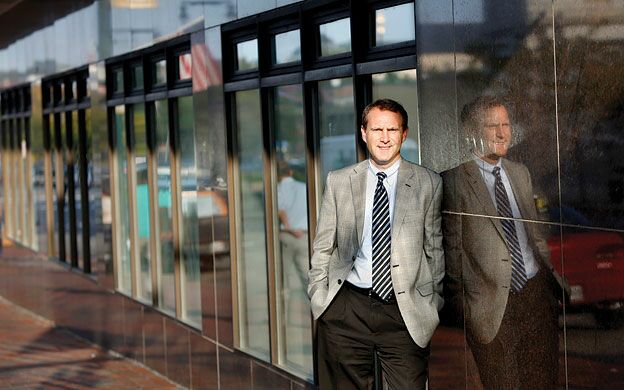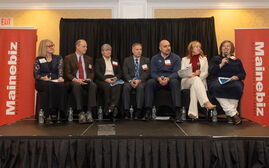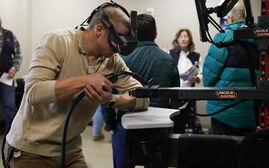Fervor for naming rights grows as building operators look for revenue streams
Over the past generation, naming rights for sports arenas has been a popular tool for stadium owners and corporations alike. What was once a novelty has become so routine that well over 70% of all professional sports franchises now play in venues named for a local or national business.
The United States is unquestionably the world leader here, with more than 275 naming rights deals concluded since 1991. It far outpaces second-place finisher Australia, which has a dozen corporate-named soccer stadiums.
Maine has joined the trend as well, with major deals concluded or in prospect for arenas in Lewiston, Bangor and Portland. Even in Maine's smaller venues, naming rights can easily run into the millions of dollars for long-term agreements.
According to Steve Rex, senior vice president for Front Row Marketing, a division of Philadelphia-based Comcast, a lot more is involved than just putting up the name on a building.
"It's part of every aspect of marketing for the complex," he says. "It's about tickets and programs, business cards and schedules, signage in the arenas, and advertising and news coverage."
Most of the businesses Front Row represents do not see arena names solely as a marketing strategy, Rex says, but as a means of supporting the community in a major civic venture; most arenas' budgets are designed only to break even, not turn a profit.
That was certainly the idea Brent Cross embraced when his family-owned insurance firm recently bought the rights to the new arena in Bangor that will replace the aging Bangor Civic Center. When it opens next year, the new facility will be known as the Cross Insurance Center, for which the company is paying $3 million over 15 years, or $200,000 a year.
"Bangor is our home, and even though we now do more business outside Maine than within the state, that doesn't change our focus," Cross says. He's executive vice president of a company that was founded by his father, Woodrow Cross, in 1954 — who, at age 95, still comes into the office daily. Cross Insurance now has 25 offices in Maine, New Hampshire and Massachusetts, and 500 employees.
Cross Insurance will have a suite at the new multi-purpose facility and Brent Cross sees it as the likely site for an annual company-wide meeting. "We've traditionally been reluctant to make long-term marketing commitments," he says, "but we felt comfortable with this one. It's important to our clients and to the community as a whole."
The company was so comfortable, in fact, that the original 10-year terms suggested by consultants for the city-owned arena was extended to 15 years at Cross' suggestion.
"If I have anything to say about it, I'd like to be able to extend it another 15 years after that," he says. "By that time, I'll be ready to retire. It's that important to us."
Bang for the buck
Steve Rex, who brokered the Bangor agreement, says Cross Insurance was an ideal sponsor for a facility that was discussed for decades but became a realistic possibility only with the 2005 opening of Hollywood Slots (now Hollywood Casino Bangor), which provided a significant new source of revenue for the city.
"Cross has been here a long time, is respected in the marketplace, and has been a significant supporter of the community," Rex says. "Both sides seem thrilled about it."
Even though intangibles are part of most naming agreements, Rex says the hard analysis is equally important. Before a proposal goes out to bid, firms like Front Row Marketing analyze audience numbers, inside and outside displays, and residual markets to predict the impact on sales.
"Typically, companies can look for a 3-1 or a 4-1 return on their investment," he says, meaning Cross should realize at least a $600,000 annual boost from the Bangor agreement.
Publicity from the July announcement of the Bangor agreement has generated a lot of requests from other organizations to consider sponsorships, Cross says, adding, "but this is the only one we'll do."
Naming gambles
Having an established company with a stable financial future like Cross might help prevent some of the oddities experienced in building names in other cities, such as Boston. There, the home of the Celtics and Bruins at North Station has been variously known as the Shawmut Center, Fleet Center and now the TD North Garden, thanks to a series of bank mergers and sales. Not to mention the now-notorious case of Enron Field in Houston, which had to be hastily re-christened as Minute Maid Park after the scandal-driven collapse of the giant energy conglomerate.
Yet there are hazards to naming deals beyond corporate turnover, as Androscoggin Bank found after it committed in 2006 to a 10-year agreement to put its name on the one-time Central Maine Civic Center in Lewiston, built in 1958 — the first major arena naming rights deal in Maine. The city had put nearly $5 million into renovations and renamed the arena as the Lewiston Colisée, which seats 4,000.
Since 2003, the Colisée had been home to the Lewiston Maineiacs, a franchise in the Quebec Major Junior Hockey League, whose games often brought in capacity crowds. But the franchise played its last games in 2010 and was dissolved by the league, leaving the Androscoggin Bank Colisée without a major tenant.
Under the 10-year agreement with Lewiston, Androscoggin Bank agreed to pay an escalating price each year, from $50,000 in year one to $91,924 in the final year, for a total commitment of $690,826.
While the loss of the Maineiacs did diminish the marketing value for the bank, Rex says, "They also had a pretty good run while the team was there and drawing so many fans." He also points out that there can still be significant value even without a resident sports franchise; Bangor has no such tenant, and instead relies on a mix of community and sporting events, including trade shows and high school tournaments, to fill the seats.
Making requests
Some out-of-state companies with a presence in Maine have also purchased naming rights. New Balance, the athletic shoe company based in Boston, does most of its manufacturing in Maine, employing 675 at three plants in Skowhegan, Norridgewock and Norway. In May 2011, it donated $5 million to the University of Maine to support its fitness center and to aid renovations to Memorial Gym. When the project is complete, the facility will be known as the New Balance Field House.
College sports programs have also attracted major corporate commitments around the country, particularly at Division 1 schools with big-time basketball and football programs. Though the agreements are generally more modest than the pro sports deals, AT&T paid $20 million for a 25-year agreement with Texas Tech.
New Balance has extended its commitments to high school teams as well. The company recently made a 10-year, $500,000 pledge to renovate an outdoor track facility in Gloucester, Mass., with the name soon to be New Balance Track and Field at Newell Stadium.
Not every naming rights venture reaches a successful conclusion. That was the case in 2009 when the Augusta Civic Center searched for a corporate sponsor and came up empty-handed, also using Front Row Marketing as a consultant.
City Manager Bill Bridgeo thinks there were two main reasons why the search failed.
"First, we were sailing into the teeth of the biggest recession since the Great Depression. There just wasn't a lot of discretionary money out there," he says. And though there was some initial interest among clients, "the city council had decided it wanted to preserve the civic center name, so we weren't necessarily selling the whole package."
A possible third reason was that, while a well-maintained facility, the civic center hadn't recently undertaken any major renovations or expansion. Steve Rex says that "a new or renovated arena is definitely an easier sell. It's a huge plus." Though, he adds, "there still can be value in a building that's up-to-date and has a positive profile in the community."
Bridgeo says he doesn't discount the idea of opening a new search now that the economic climate is beginning to warm, though there are no plans to do so now.
"We'd like to keep an open mind about this," he says.
Exposure in Portland
A new and improved facility is unquestionably a big part of the latest naming rights opportunity in Maine. A renovated Cumberland County Civic Center, on which construction began in August, will add 2,000 seats to the existing 6,700 and increases the likelihood that the Portland Pirate American Hockey League franchise will sign another long-term lease; it's currently using one-year extensions of the original agreement.
The $33-million civic center upgrade was approved by county vote in November 2011, and is expected to be completed by September 2013. This fall, the Pirates will play about a half dozen games at the Androscoggin Bank Colisée to the north during the most intense construction in Portland, briefly returning hockey fans to that venue.
Naming rights are expected to be a key part of the financing package in the Portland facility, as they have been in many other cities. Front Row Marketing is one of three companies that responded to a RFP for a consultant issued by the county, and Steve Rex says he looks forward to meeting with the marketing committee this fall.
Brian Dudley, a county trustee who heads the joint ad hoc committee for naming rights, composed of both marketing and finance members, says the group will proceed deliberately.
"We're new at this, so we need to educate ourselves," he says.
The Bangor agreement, he says, offers an interesting comparison, but the committee has yet to set any financial targets.
"That's what the consultants are for. We'll be leaning heavily on the advice they can provide for us," he says. As for the likely corporate partner, Dudley says he's keeping an open mind. "It could be a local company, it could be national. We're expecting a high degree of interest once the process gets rolling."
Cumberland County did have one previous naming rights agreement, which could be seen as a non-rights deal as well. In 1996, the Libra Foundation, a charitable enterprise founded by Elizabeth Noyce, paid the county $1.35 million for a 10-year agreement that retained the civic center's traditional name — an offer made after then county commissioners announced their intent to find a corporate partner.
Previously, Libra had offered Portland $20 million for a new arena in the Bayside neighborhood that the city turned down. Since that naming rights agreement with the county expired, Rex says, "they've lost that revenue stream, which does affect the operation."
In 2010, when the current renovation plan was first being discussed, County Manager Peter Crichton suggested that naming rights could bring in $250,000 a year. An earlier renovation discussion, in 1999, suggested the naming rights could bring in as much as $500,000 annually, supporting an operating budget that was then about $3 million a year.
Brian Dudley says the joint committee has not yet decided whether all, or part, of the existing name will be preserved — a point he acknowledges still provokes discussion, as it did when the Libra Foundation made its pitch. Since its initial construction in 1977 at a cost of $8 million, "It's always been the Cumberland County Civic Center," he says. Whether and how that might change, he says, will be the subject of some intense discussion this fall as the county makes decisions on what the facility will be called when it re-opens next year.
Model revenue
Steve Rex doesn't see the naming rights boom going away any time soon. It provides proven value for business owners, he believes, and can be quantified in dollar-and-cents terms even more than traditional advertising and marketing purchases.
"Wherever there's an arena under construction, you know there's going to be consideration of selling the name," he says.
In fact, he sees the United States as a model for companies internationally in the years ahead.
"Europe is starting to give this a hard look, and deals are being struck," says Rex. "They really are coming around to the same point of view."
Douglas Rooks, a writer based in West Gardiner, can be reached at editorial@mainebiz.biz.
Read more















Comments